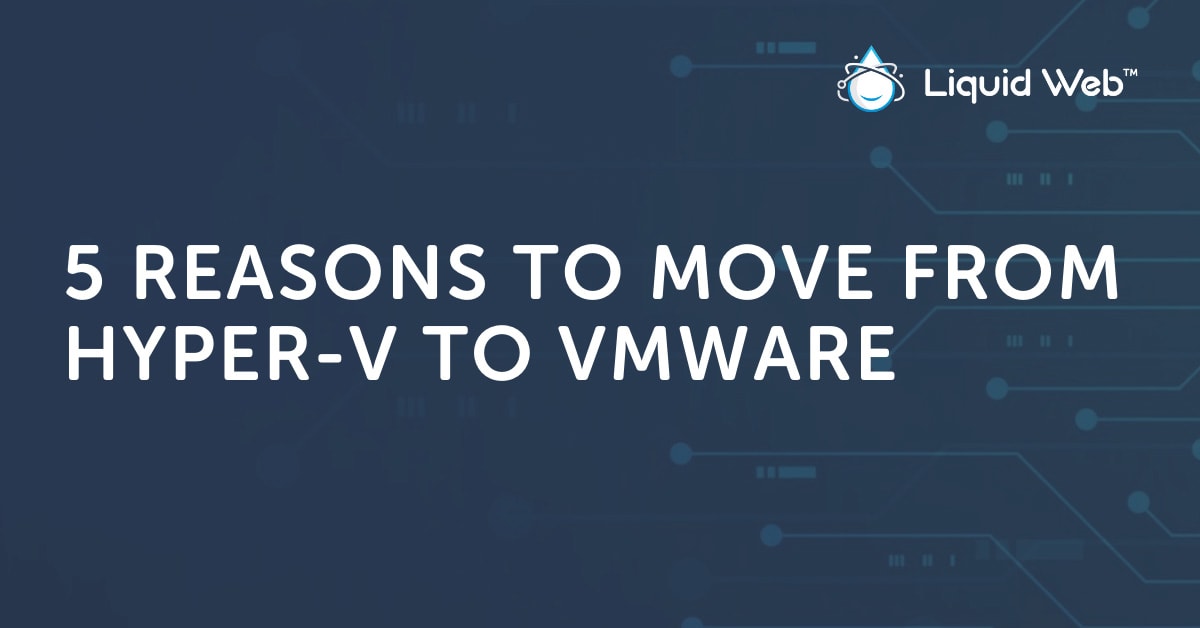
Trying to decide on using VMware for your virtual environment vs Hyper-V?
The power of virtualization technology is available to every business. Such a statement would have seemed bold as recently as a decade ago.
Now, virtualization is common both for businesses themselves and via the applications and services those businesses count on. But not all virtualization solutions are created equal and what is a great solution for one business might be a bad fit for another.
Virtualization is the process of using software to replicate what was previously only available via hardware.
For example, a dedicated server can run many applications or host many websites, but if any of those applications or websites experiences a surge in traffic or needs extra storage, those needs come at the expense of the other applications.
In some cases, these needs can crash the entire server, affecting all the applications, even those that were simply minding their own business.
With virtualization, different separate “virtual” servers are created. This divides the resources as directed so that a website with too much traffic or an application needing more storage will not impact the other tenets.
Virtualization is a great way to protect the network, maximize return on investment, and get the most out of server resources without always having to buy more hardware.
Two of the more popular providers of virtualization software are Hyper-V and VMware.
Both companies provide the tools necessary to virtualize, manage, and maintain infrastructure. And while their core virtualization products are very similar, necessary add-ons like Hyper-V System Center and VMware vSphere are quite different.
This post will uncover the difference between Hyper-V vs VMware for those considering making the switch.
What is Hyper-V?
Hyper-V is the virtualization system offered by Microsoft. Originally called Windows Server Virtualization, Hyper-V was released in 2008 and serves to create virtual machines running Windows.
Hyper-V is known as a bare-metal hypervisor because it operates directly on the hardware itself, below the operating system or any other virtualized components.
Hyper-V is fast and scalable because of its architecture. This architecture, known as “microkernalized” allows Hyper-V’s services to run independent of the hardware layer.
Hyper-V is flexible and efficient because of how it is architected, giving Windows users excellent performance and manageability.
Because Hyper-V was created by Microsoft, it is tailor made to work with other Microsoft products and services. If running Windows as an operating system, then Hyper-V fits like a glove.
Additionally, Hyper-V includes the ability to migrate or port virtual servers without downtime, even across different environments.
That said, Hyper-V is not without its limitations or drawbacks. That deep reliance on the Microsoft ecosystem means the needs of certain businesses simply cannot be addressed or served with Hyper-V.
What is VMware?
Launched in 1998, VMware was perhaps the first to-market virtualization software. VMware allows both desktop machines (Linux and Windows) and servers to be virtualized, giving businesses of all sizes maximum flexibility for their IT infrastructure.
VMware’s robust service offering includes a suite of tools that help maximize the virtualization experience for companies large and small.
Originally built for the mid-market, VMware most certainly also serves the enterprise and is one of the most popular virtualization application suites globally.
VMware is flexible in nature and supports a wide variety of operating systems and applications, even when running on the same machine. VMware is built to help reduce data center costs, improve the efficiency of existing hardware, and help older technologies find extended life through virtualization.

5 Key Reasons to Choose VMware
Here are five specific reasons to consider VMware compared to Hyper-V:
1. Superior File System
Conversely, VMware’s file system is intuitive and straightforward both to get started with and to use as your organization grows.
2. More Flexible Security
Hyper-V security is managed via Active Directory. As with most components of Hyper-V, this is great for users that leverage the Microsoft ecosystem.
But what if you have needs above and beyond Windows?
VMware encrypts data both at rest and in transit, relying on default data security best practices. This means VMware users have greater flexibility in how they secure data and systems as they do not have to rely entirely on Microsoft’s suite of security products.
3. Supported Operating Systems
VMware supports not just Linux and Windows, but also macOS and Unix.
While Microsoft’s reputation for working with other technologies has improved in the last decade, Hyper-V is largely built for Windows, Linux and only a handful of other operating systems. This limitation tends to show up most often when legacy applications and systems are being modernized and simply will not work with Hyper-V.
In this age of digital transformation, limiting your company’s ability to bring older yet necessary systems and applications into your virtual environment can be a mistake with severe consequences.
4. Scalability and Provisioning
When thinking about scalability and provisioning, it is critical to have as much compute as possible. Modern applications require more processing horsepower than ever before to operate correctly. And while Hyper-V is optimized for physical memory during provisioning, VMware has an edge in terms of how many CPUs per host can be deployed. These CPUs can be the difference between an environment that moves along at a snail’s pace or an environment that delivers the performance necessary to meet even your greatest demands.
5. Ongoing Management and Utilization
VMware does not require security patches for its Controlling layer components. Additionally, VMware has excellent vendor support and no operating system requirement for controlling the managing components.
Conversely, Hyper-V has frequent OS and security updates which can lead to greater overhead. Hyper-V also requires an operating system to be installed to make the hypervisor layer functional. These differences can add up to real time and resource savings for those that choose VMware.
Prioritizing What is Important for Your Business
As with most technology, there are some situations where a tool can be a great decision and others where the absence of features or functionality can be a deal-breaker. When it comes to virtualization in the enterprise, a decision made today is likely to impact the business for years. The most obvious deal-breaker with Hyper-V is the dependence on the Windows ecosystem if users wish to access its full power.
Conversely, VMware’s support of so many different operating systems makes it flexible and great for a number of use cases and environments.
Add in VMware’s flexibility when it comes to security, its advantages in provisioning and scalability, and its superior file systems and the case for VMware is quite clear.
Partner with VMware Private Cloud and Liquid Web
Liquid Web works with small and medium businesses as well as managed service providers and IT firms to deliver the right virtualization solutions for driving business forward. Our deep expertise in the setup, deployment and management of VMware Private Cloud makes Liquid Web a standout partner you can trust.
Contact us today if you would like to learn more about these applications and how either might help your business grow.
[ad_2]
Source link


![Hyper-V vs VMware [5 Reasons to Choose VMware]](https://dealzclick.com/wp-content/uploads/2022/01/Intel-Welcomed-to-India-by-IT-Minister-Ashwini-Vaishnaw-as.jpg)
![Hyper-V vs VMware [5 Reasons to Choose VMware]](https://dealzclick.com/wp-content/uploads/2022/01/1643613694_Unauthorized-Affiliate-error-page.jpg)



